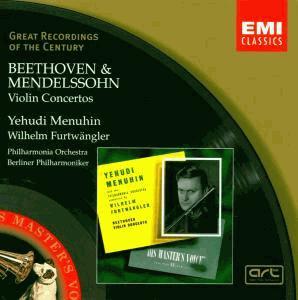
| Artist: | Ludwig van Beethoven |
| Title: | Violin Concertos |
| Released: | 1954 |
| Label: | EMI Classics |
| Time: | 71:31 |
| Producer(s): | |
| Appears with: | |
| Category: | Classic |
| Rating: | *********. (9/10) |
| Media type: | CD |
| Purchase date: | 2001.01.06 |
| Price in €: | 8,58 |
| Web address: | www.emiclassics.com |